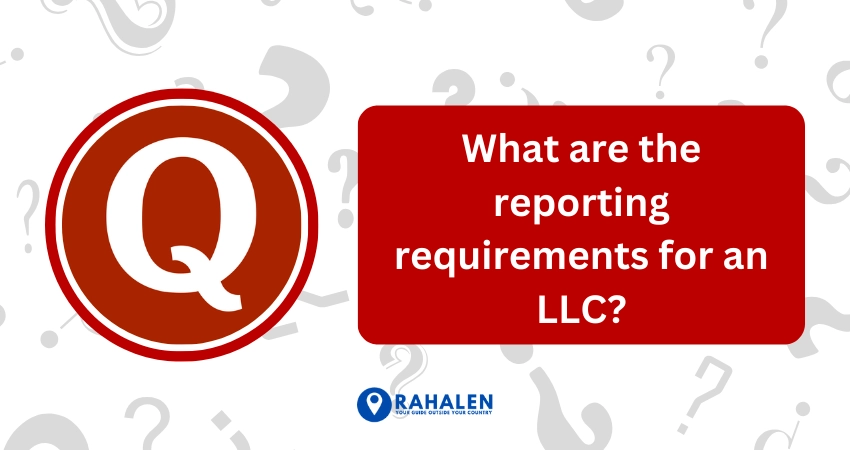Starting and running a Limited Liability Company (LLC) can be exciting. However, navigating the various regulatory obligations might seem like stepping into a maze. Fear not! In this article, we’ll unravel the complexities and shed light on the reporting requirements for an LLC, making it as clear as a summer sky.
What are the reporting requirements for an LLC?
Reporting requirements for a Limited Liability Company (LLC) can vary depending on the jurisdiction and the specific regulations governing LLCs in that location. However, I can provide you with a general overview of common reporting requirements in the United States, which is a common jurisdiction for LLCs:
- Annual Reports: LLCs must file an annual report with the state government in many states. This report typically includes information about the LLC’s members, managers, and sometimes its financial status. The due date and filing fee can vary by state.
- Taxes: LLCs are typically considered pass-through entities for tax purposes, meaning the business does not pay taxes. Instead, the profits and losses are passed to the individual members, who report this information on their tax returns. However, some states may have additional tax requirements, so it’s essential to check the specific rules in your state.
- Operating Agreement Updates: While not a formal filing with the government, LLCs should regularly review and update their operating agreement if there are changes in ownership, management, or other significant aspects of the business.
- Business Licenses and Permits: Depending on the nature of the LLC’s business and its location, there may be various local, state, and federal licenses or permits required. Ensuring compliance with these requirements is crucial.
- Changes in Information: If there are any changes in the information provided during the LLC’s formation (such as changes in members, addresses, or business activities), some states may require the filing of amendments or updates.
It’s important to note that these requirements can vary significantly by state, so it’s advisable to consult with a legal or tax professional to ensure compliance with the specific regulations applicable to your LLC. Additionally, keeping accurate and up-to-date records is essential for fulfilling reporting requirements and maintaining good standing with the relevant authorities.
All About LLC
- What is an LLC?
An LLC, or Limited Liability Company, is a flexible business structure that combines a partnership’s simplicity with a corporation’s liability protection.
- Why Choose an LLC?
Before delving into reporting requirements, let’s quickly explore why many entrepreneurs opt for the LLC structure. Picture it as a versatile tool – providing liability protection without the intricate formalities of a corporation.
Navigating the Regulatory Landscape: Reporting Obligations
- Initial Reports: Setting the Foundation
When establishing an LLC, an initial report is often required. This serves as an introduction to the state, detailing essential information about the company.
- Annual Reports: Keeping the Momentum
Unlike some entities, LLCs generally have an annual reporting requirement. This is your chance to update the state on any changes in ownership, management, or business activities.
- State Taxes: A Vital Aspect
LLCs must navigate state tax obligations. The specifics vary, but understanding and fulfilling these requirements is crucial for compliance.
- Employment Taxes: Beyond the Basics
If your LLC has employees, you’re entering the realm of employment taxes. Dive into the intricacies of withholding, reporting, and paying employment taxes.
- Sales and Use Tax: A Local Touch
Operating in multiple states? Brace yourself for a patchwork of sales and use tax requirements. Unravel the complexities to ensure seamless compliance.
- Licenses and Permits: The Regulatory Checklist
Beyond financial reports, LLCs may need to renew licenses and permits regularly. Think of it as the regulatory checklist to keep your business legally afloat.
- Ongoing Compliance: A Continuous Journey
Staying compliant is a task that takes time to complete. Explore the ongoing obligations to avoid pitfalls and maintain a smooth operation.
The Roadmap to Compliance: A Quick Recap
- Best Practices: Navigating Smoothly
Let’s explore some best practices to keep your LLC ship sailing smoothly through the sometimes turbulent waters of regulatory compliance.
In conclusion, understanding the reporting requirements for an LLC is pivotal for a thriving business. It’s not about drowning in paperwork but ensuring your ship sails smoothly.
FAQs
- Do I Need to File Reports Immediately After Forming an LLC?
Yes, an initial report is typically required shortly after formation. Think of it as introducing your LLC to the state authorities.
- How Often Should I Submit Annual Reports?
Most states mandate an annual report. Keep a keen eye on deadlines to avoid penalties and maintain good standing.
- What Happens If I Miss the Reporting Deadlines?
Missing deadlines can lead to penalties or, in extreme cases, the dissolution of your LLC. Stay vigilant and mark those dates on your calendar.
- Are Reporting Requirements Uniform Across States?
No, each state has its own set of rules. Familiarize yourself with the specific requirements of the state where your LLC is registered.
- Do Single-Member LLCs Have the Same Reporting Obligations?
Yes, whether single-member or multi-member, the reporting obligations are generally applicable. It’s crucial to stay informed about your specific state’s requirements.
Embark on this regulatory journey with confidence, armed with the knowledge of reporting requirements for your LLC. Remember, compliance is not just a legal obligation – it’s the wind in your entrepreneurial sails.



